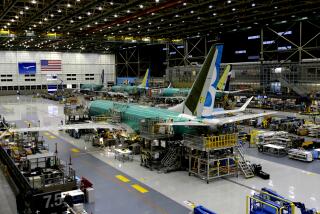Boeing Facing Roadblocks on Airport Safety
- Share via
CHICAGO — Boeing Co. was given what some call a near-impossible task three months ago of helping the U.S. government meet a congressional mandate to install thousands of machines to detect explosives in luggage by Dec. 31.
The Transportation Security Administration, created after the Sept. 11 attacks, won’t have enough machines ready in as many as 30 airports, Transportation Secretary Norman Y. Mineta said last week.
While early stumbling blocks included getting manufacturers to make enough machines in time, Boeing and subcontractors such as Siemens that were hired to install the devices can’t find places to put them. An explosive-detection machine, which uses CAT-scan technology to analyze bags, is the size of a minivan.
Boeing’s team has a “tremendously difficult job,” said Hans Weber, an aviation-security consultant based in San Diego. “Every airport has its own design and operational idiosyncrasies.”
Denver International Airport, with 36 million passengers a year, would need to install 50 of the systems.
Even with more than 6 million square feet of space, that would violate local building codes, said Amy Bourgeron, Denver’s deputy manager of aviation. “There would be no room for the passengers,” she said.
Other airports will have to reinforce floors to support the 6-to 8-ton machines, and McCarren International Airport in Las Vegas will need additional electric supplies for its terminals, said Randall Walker, director of aviation for Clark County, Nev.
Miami International Airport’s security chief, Mark Forare, said retail space would have to be scaled back to accommodate the machines.
Boeing told Houston’s George Bush Intercontinental Airport it needs to build additions to two of its terminals, said Ernest DeSoto, a spokesman.
As of Aug. 1, only 217 of the 1,100 explosive-detection systems U.S. airports need had been installed, according to the Transportation Department. About 275 of the 6,000 smaller machines required to detect explosive traces were in use.
As of Aug. 20, Boeing’s team had visited 250 airports to discuss equipment location with officials, according to the Transportation Security Administration.
Chicago-based Boeing has submitted proposals to the Transportation Security Administration for 62 of the airports, said Fernando Vivanco, a Boeing spokesman. The government has yet to approve any of the proposals, he said.
TSA spokesman Robert Johnson declined to comment.
Boeing expects to be able to complete the work on time, said Richard Stephens, the Boeing executive in charge of the project. He wouldn’t provide more details.
Others aren’t so sure.
Robert Poole of the Los Angeles-based Reason Foundation public policy research group estimates that the companies may need six more months.
“TSA doesn’t have the staff to review all of these” plans, Poole said.
The plans may be moot if the machines never arrive. Only two companies, InVision Technologies Inc. and L-3 Communications Holdings Inc., are government-certified makers of the explosive-detection machines. InVision has hired a contractor to help it fill the orders, InVision Chief Operating Officer Donald Mattson said. L-3 spokesman Evan Goetz declined to comment.
Critics say the government’s need to respond to security concerns after Sept. 11 led it to expect too much too soon and to rely on unproven technology and small companies with little capacity to match large orders for equipment.
Boeing was awarded a $508-million contract in June to help fulfill the congressional mandate.
To meet the deadline, the government will have to use a combination of $1-million explosive-detection machines and manual trace detectors. Smaller airports may get trace detectors only.
More to Read
Inside the business of entertainment
The Wide Shot brings you news, analysis and insights on everything from streaming wars to production — and what it all means for the future.
You may occasionally receive promotional content from the Los Angeles Times.










